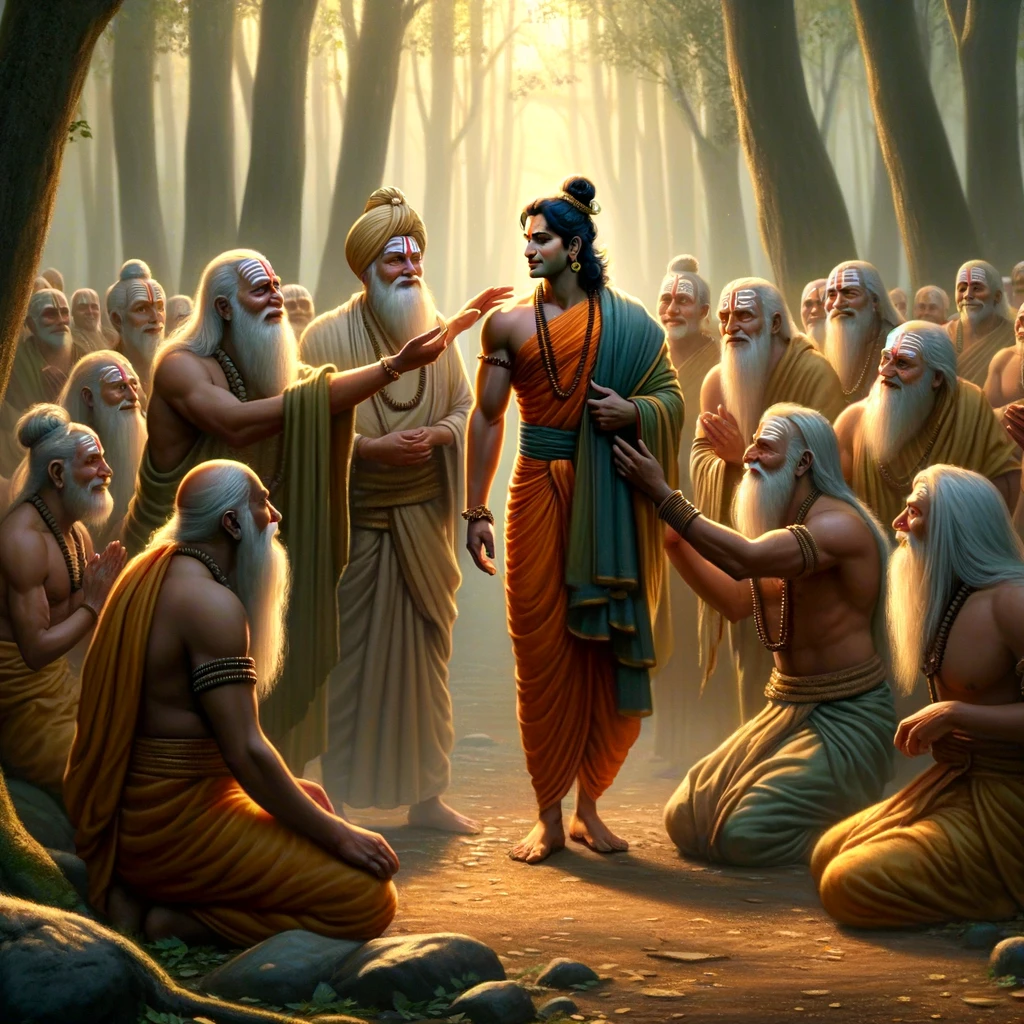Summary
Rama, Seetha, and Lakshmana enter the great forest called Dandaka Forest and adore the eminent sages, who are in penance and hermitages in that forest. This canto is named as Aranya Kanda not just to show that Rama roved over just forests. The forests, as per Indian tradition, are the treasure houses of knowledge, and they are the ultimate in Vedic culture.
Thus, until Ayodhya Kanda Rama's exile is in aaryavarta, the place of noblemen, from River Ganges to Greece. Now Rama is stepping into an area called Janasthaana, meaning people's place. This Janasthaana is the place where Rama eradicated certain negative aspects of the then anarchic individualized dominions where jungle law was the only recourse and brought all of them under one roof. Though people lived there about along with sages and demons as well, demonic influence is said to be predominant, as per Ramayana or other Purana’s. These demons are narrated to be man-eaters, but not cannibals who eat their own tribesmen.
Chapter [Sarga] 1 in Detail
On entering the impenetrable Dandaka forest that courageous and unassailable Rama saw clusters of hermitages of sages. [3-1-1]
Overspread with Darbha, the sacred grass, and jute clothing, well pervaded with Vedic splendor and well glowing like the un-seeable solar arena in the sky, with naked eye. [3-1-2]
Those hermitages have well-tidied thresholds on all sides, dense with many deer and teemed with many groups of birds, and they are the recourse for all living beings. [3-1-3]
Those hermitages are always adored by groups of Apsaras with their continued dancing, their Holy Fireplaces are very broad, and are with oblation items, vessels, deerskins and sacred grass, and they are beaming forth with gigantic trees that yield sacred and palatable fruits, and with ritual fuels, and water vessels, tubers and fruits. [3-1-4, 5]
Those hermitages are sacrosanct for Ritual fire is being worshiped with fire-oblations and sacrifices to the reverberating Vedic sounds, and they are enwrapped with lotus ponds with lotuses, and even with flowers of forest. [3-1-6]
They have age-old saints with controlled senses who are clad in jute cloths and deerskin, and who subsist on fruits and tubers alone, ye their resplendence is like that that of the Sun-god or the Fire-god. [3-1-7]
Rama has seen such a cluster of hermitages that is glistening forth just by the presence of holy saints whose sustenance is constrained, and that hermitage is distinctive like Brahma's abode, reverberating with the sounds of that Brahma's Vedic chants alone. [3-1-8]
That glorious and great resplendent Rama on seeing those precincts of hermitage that is graced with highly blest Brahmans, the knower of Brahma, neared it, unstringing the bowstring of his great bow. [3-1-9-10a]
Those great sages, the possessors of divine knowledge, are gladdened on seeing Rama and illustrious Seetha, and they moved towards them welcomingly. [3-1-10-11a]
But those sages who are austerely committed to vows, on their seeing Rama, the treader [follower] on the path of rectitude [righteousness], and who is now arising like moon, and at Lakshmana and at glorious Seetha as well, rendered Vedic blessings and welcomed the trio. [3-1-11a-12]
Those forest-dwelling sages saw the physical built its augustness and gracefulness, and his fine attire remaining in astonished postures. [3-1-13]
The forest-dwellers saw Rama, Seetha, and Lakshmana without a wink on their own eyes [as though the Vishnu along with Goddess Lakshmi and Thousand headed-serpent, aadi shesha are coming from their abode Vaikuntha to this hermitage, for this hermitage is like Brahma's abode, as already said, thus the sages lost their wink. And loosing any single wink will loose the sight of these divinities from Vaikuntha; hence their unannounced arrival caused surprise in them, which further caused a wink-less state [3-1-14]
Those august sages that are interested in the well being of all beings have indeed accommodated Rama in that hermitage, as Rama is their guest a priori. [3-1-15]
Then those august sages who are similar to sacred fire in glow have procedurally accorded guest-ship to Rama, and fetched water for him. [3-1-16]
On sounding out Vedic blessings those virtuous sages have offered flowers, fruits and tubers, and even the entire hermitage to that great soul Rama, and then with their palms adjoined. [3-1-17-18a]
"The king will have great renown for he is the ruler of the righteousness of these people, a protector, a respectable and adorable one, and as he wields the scepter [royal or imperial authority] of justice, he is a revered one too... [3-1-18-19a]
"The fourth part of Indra is the protector of people, called the king, and hence Oh! Raghava, the king is hailed, and hence he enjoys best and delightful fortune... [3-1-19b-20a]
"You alone have to protect us as we are the subjects living in your kingdom...may you be in the capital... or in the forest...you are our king... [3-1-20b, c]
"We gave-up punishments, either physically or by the power of curses, conquered are our anger and senses, and our ascesis is the only wealth of ours, thus oh! King, we are to be protected by you, like the fetus inside a womb... [3-1-21]
Thus saying they worshipped Raghava along with Lakshmana, on giving fruits, tubers, flowers and other varieties of forest foods. [3-1-22]
Thus other saints and sages who are the followers of the virtue, and similar to the Sacred Fire adored Rama, the king, according to the wont of custom. [3-1-23]
Thus, this is the 1st chapter in Aranya Kanda of Valmiki Ramayana, the First Epic poem of India.
Sriman Moola Rama Vijayate


